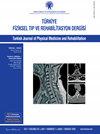基于瑜伽的锻炼对COVID-19大流行期间感染医护人员的功能能力、呼吸困难、生活质量、抑郁、焦虑和睡眠的影响:一项前瞻性临床试验
IF 1.1
4区 医学
Q3 REHABILITATION
Turkish Journal of Physical Medicine and Rehabilitation
Pub Date : 2023-10-01
DOI:10.5606/tftrd.2023.11605
引用次数: 0
摘要
目的:研究以瑜伽为基础的运动对2019冠状病毒病(COVID-19)后的功能能力、呼吸困难、生活质量、抑郁、焦虑和睡眠质量的影响。患者和方法:41名covid -19感染的医护人员(女性35人,男性6人;平均年龄:39.7±6.5岁;年龄在28至55岁之间),在亚急性期积极工作的患者被纳入2021年3月至2021年9月的前瞻性对照研究。参与者被分为两组:瑜伽运动组(YBEG);N =26)和不干预组(N =15)。除了常规的建议外,YBEG还进行伸展、放松、等距强化、呼吸和冥想练习,每周两次,每次60分钟,持续8周。临床结果通过两组患者8周前后的柔韧性测试(肩部柔韧性、坐位和伸展测试)、握力、6分钟步行测试、呼吸困难评分、贝克抑郁和焦虑量表、SF-36生活质量量表、匹兹堡睡眠质量指数(PSQI)和国际体育活动问卷(IPAQ)进行测量。结果:Beck焦虑评分、IPAQ评分、PSQI、SF-36疼痛、社会功能子参数在YBEG中均有显著正统计学意义(p<0.05)。唯一在时间和组间不显著的参数是SF-36心理健康子参数(p>0.05)。此外,在8周干预前后,YBEG在肌肉力量、柔韧性、功能能力、身体活动水平、生活质量、焦虑、抑郁水平和睡眠评分方面均有显著改善(p<0.05)。结论:在2019冠状病毒病后重返工作岗位的医护人员中,瑜伽项目提高了功能能力和身体表现,减少了焦虑和抑郁的抱怨,提高了生活质量。本文章由计算机程序翻译,如有差异,请以英文原文为准。
Effect of yoga-based exercises on functional capacity, dyspnea, quality of life, depression, anxiety, and sleep of infected healthcare workers during the COVID-19 pandemic: A prospective clinical trial
Objectives: The study aimed to investigate the effect of yoga-based exercises on functional capacity, dyspnea, quality of life, depression, anxiety, and sleep quality following coronavirus disease 2019 (COVID-19). Patients and methods: Forty-one COVID-19-infected healthcare professionals (35 females, 6 males; mean age: 39.7±6.5 years; range, 28 to 55 years) who were actively working during the subacute period were included in the prospective controlled study between March 2021 and September 2021. The participants were divided into two groups: the yoga-based exercise group (YBEG; n=26) and the nonintervention group (n=15). Besides routine recommendations, the YBEG performed stretching, relaxation, isometric strengthening, breathing, and meditation exercises of 60 min twice a week for eight weeks. Clinical outcome was measured with flexibility tests (shoulder flexibility and sit and reach tests), hand grip strength, 6-min walk test, dyspnea score, Beck Depression and Anxiety Inventory, Short Form 36 (SF-36) quality of life, Pittsburgh sleep quality index (PSQI), and the International Physical Activity Questionnaire (IPAQ) before and after eight weeks in both groups. Results: Beck anxiety scores, IPAQ scores, PSQI, SF-36 pain, and social functioning subparameters were positively statistically significant in the YBEG (p<0.05). The only parameter found to be insignificant in time and between groups was the SF-36 mental health subparameter (p>0.05). In addition, the YBEG had significant improvements in muscle strength, flexibility, functional capacity, physical activity level, quality of life, anxiety, depression levels, and sleep scores between before and after the eight-week intervention period (p<0.05). Conclusion: Yoga programs have led to an increase in functional capacity and physical performance, a decrease in anxiety and depression complaints, and an increase in the quality of life in healthcare professionals who were in the process of returning to work during the post-COVID-19.
求助全文
通过发布文献求助,成功后即可免费获取论文全文。
去求助
来源期刊

Turkish Journal of Physical Medicine and Rehabilitation
Health Professions-Physical Therapy, Sports Therapy and Rehabilitation
CiteScore
2.20
自引率
0.00%
发文量
0
期刊介绍:
The Turkish Journal of Physical Medicine and Rehabilitation (Formerly published as Türkiye Fiziksel Tıp ve Rehabilitasyon Dergisi) is the official journal of the Turkish Society of Physical Medicine and Rehabilitation. The journal is an international open-access, double-blind peer-reviewed periodical journal bringing the latest developments in all aspects of physical medicine and rehabilitation, and related fields. The journal publishes original articles, review articles, editorials, case reports (limited), letters to the editors. The target readership includes academic members, specialists, residents working in the fields of Physical Medicine and Rehabilitation. The language of the journal is English and it is published quarterly (in March, June, September, and December).
 求助内容:
求助内容: 应助结果提醒方式:
应助结果提醒方式:


